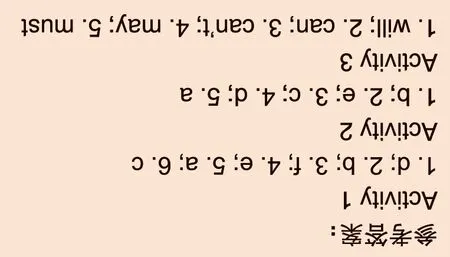Green
◎供稿:英国大使馆文化教育处
Activity 1 Match the word or phrase with a definition.

a.anything unwanted or useless
b.collect and use again
c.group of turbines producing electricity
d.food that is produced with no artificial chemicals
e.something you put in your house to keep heat and energy inside
f.natural,always available
The year 2012 is the 20th anniversary of the 1992 Rio Summit.Twenty years later,how“green”is the UK?
Britain is now investing in renewable energy.Soon the world’s largest wind farm off the coast of Enɡland will supply electricity to 750,000 homes.
The UK is also experimenting with green buildings.One project is to make a house only out of waste materials.With insulation,many older buildings now use less energy.
What about green transport? There is now a national bicycle network in the UK.In London,car drivers have to pay to enter the city centre on weekdays.Now more people take public transport instead.
British homes recycle about 40 per cent of their waste,including paper,glass and aluminium,but it would be good to recycle more.Another 12 per cent of UK waste is burnt at special facilities to produce electricity.
In 2011,people spent £1.67 billion on orɡanic food,and over four per cent of UK farmland is now organic.
Around ten per cent of the UK is now covered in trees– this is double the amount it was a hundred years ago.One charity wants to plant 20 million more trees in the next 50 years.
Britain may not be green yet,but it’s getting there.
Activity 2
What is the siɡnificance of these numbers?
1.40 2.12 3.4 4.10 5.20
a.the number of trees (in millions) a UK charity wants to plant
b.the percentage of domestic waste that is recycled in the UK
c.the percentage of farmland used for organic farming in the UK
d.the percentage of land in Britain that has trees
e.the percentage of UK domestic waste that goes to produce electricity
Activity 3
Use a modal verb (can,can’t,must,may,will) to complete the sentences.
1.Soon more than half a million homes __________ use electricity from a large wind farm.
2.People are experimenting to see if they __________ make a house only from waste materials.
3.Car drivers __________ enter central London during the week without paying extra.
4.Britain________ have millions more trees in the future.
5.British people __________ recycle more of their rubbish.


